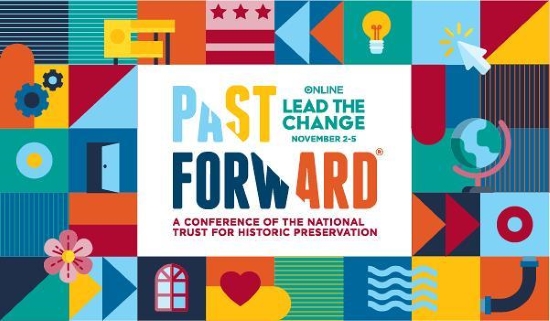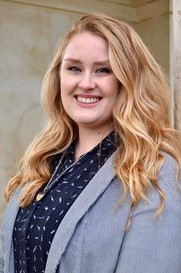Reflections on PastForward 2021
By Delaware Division of Historical and Cultural Affairs Inclusive History Researcher Carolanne Deal
As an inclusive history researcher for the Delaware Division of Historical and Cultural Affairs’ Collections, Affiliates, Research and Exhibits (CARE) Team, I was selected to receive a Diversity Scholarship to attend the National Trust for Historic Preservation’s annual conference, PastForward 2021, which took place virtually from Nov. 2 to 5, 2021. The theme for this year’s conference was “Lead the Change” and sessions covered a variety of subjects including “Treaties With Native Nations and Their Relevance Today,” “LGBTQ and Historic Preservation” and “Re-Framing History for Public Audiences.” My scholarship not only allowed me to attend the conference, but to also receive insight from a mentor and network with a group of fellow diversity scholars.
I was pleased to see my colleague, Carlton Hall, as he received a scholarship to attend the conference as a mentor. In 2018, Hall earned a place on the National Register of Historic Places’ “40 Under 40” list for his work about Delaware listings in the Green Book, a segregation-era travel guide for African Americans. Hall is a preservation specialist with the State Historic Preservation Office located in Dover, and his team, among other responsibilities, helps owners list their properties in the National Register.
The first session of each day, we were welcomed by Katherine Malone-France, the National Trust’s chief preservation officer, and introduced to a few of the speakers who would present on their change-making work. One of my favorite sessions was called “Creative Approaches to Telling the Full American Story,” presented by the African American Cultural Heritage Action Fund’s DuPont Fellows. Panelists shared the unique ways their work encourages people to engage critically with history. At this time, I was introduced to Hannah Price, a photographer working in Philadelphia, who uses her art to document historic houses significant to local African American communities. By photographically capturing the interiors and exteriors of these spaces that are not accessible to the public, Price is preserving cultural heritage for the future. As a photography hobbyist myself, Price’s work was particularly inspiring as I had not previously considered grassroots documentation of sites as a form of historic preservation. In addition to capturing the past, Price’s work also documents contemporary culture in Philadelphia. Price and her practice prompted me to consider how I, a queer photographer, could document my own contemporary LGBTQ+ community in Delaware as a means that merges art and historic preservation.
Another session which impacted me was “LGBTQ and Historic Preservation” in which panelists shared the strategies and tools they implemented to increase the diversity of stories and experiences included in the historical record. As a starting point, they suggested researching historic places listed in the National Register to find LGBTQ+ stories that have not yet been told. For example, the narrative at the Eleanor Roosevelt Historic Site is expanding to include her romantic relationship with a woman. This strategy of examining existing historic sites for untold stories of underrepresented people is currently being implemented in my research within the State of Delaware’s Historic Collection.
During the opening plenary session on the second day of the conference, I learned that the Landmark Society of Western New York had developed a LGBTQ Landmarks Initiative to plot LGBTQ+ landmarks on a digital map and make it accessible to the public. Since many places of significance to the LGBTQ+ community have been obscured, or simply do not exist anymore, a digital map to preserve the sites presents a unique way to make this unique history known. Were we to create a similar initiative in Delaware, it would be a powerful and accessible way for queer people to safely engage with their history from the comfort of their homes. Similar programs could be created for other marginalized communities and their historic sites that have been destroyed or are difficult to demarcate.
Throughout the conference, multiple panelists stressed the importance of representation of diverse communities in existing and future historic sites. As someone whose work directly involves researching, procuring and preserving artifacts from underrepresented communities, this conference was enormously helpful and inspiring. Even my position as an inclusive history researcher is a testament to the change that has already been made and shows the growing demand for specialists in the field of public history. I am so grateful to have received the Diversity Scholarship from the National Trust for Historic Preservation and am looking forward to more opportunities like this in my work for the division.
Inclusive History Researcher Carolanne Deal is working to highlight the stories often relegated to the margins of history and making those stories accessible to the public. She holds a bachelor’s degree in art history and a master’s degree in art history for museum professionals, both from the University of Delaware.




